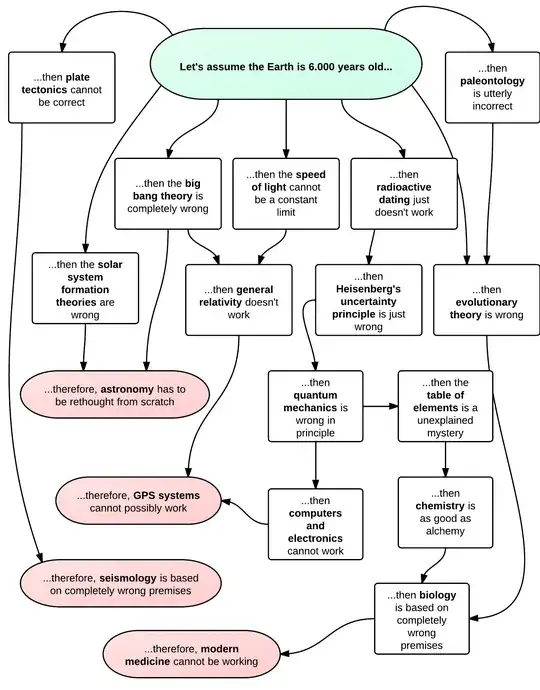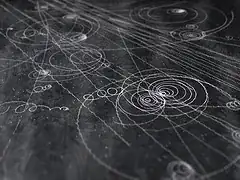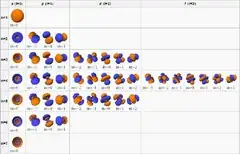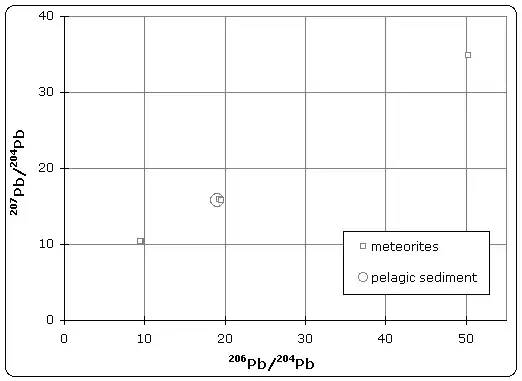Introduction
Over the ages, people have developed
techniques for investigating phenomena, acquiring new knowledge, or
correcting and integrating previous knowledge. To be termed
scientific, a method of inquiry must be based on gathering empirical
and measurable evidence subject to specific principles of reasoning
quote from: Scientific method, Wikipedia
Those techniques of inquiry are usually known as scientific method. Working hypotheses are proposed as explanations for phenomena, and are then tested with experiments. A hypothesis must be able to predict some outcome, and it must be possible to test if the prediction is wrong.
Falsifiability or refutability of an assertion, hypothesis or theory
is the logical possibility that it can be contradicted by an
observation or the outcome of a physical experiment.
quote from: Falsifiability, Wikipedia. See Karl Popper, Logic of Scientific Discovery. In the meantime check Science: Conjectures and Refutations as an introduction.
Theories are groups of hypotheses which have some logical structure and help "explain" phenomena in a common mental framework.
Theories that encompass wider domains of inquiry may bind many
independently derived hypotheses together in a coherent, supportive
structure. Theories, in turn, may help form new hypotheses or place
groups of hypotheses into context.
from: Scientific method, Wikipedia
If some phenomena in the field are not predicted by the current (dominant) theory, then hypotheses with which we could explain that phenomena are formed and tested. Those that can be incorporated in the current theory are. If a tested hypothesis cannot be incorporated in the current theory, then that theory is changed, or a new theory which better fits all experimental data becomes dominant.
see The Structure of Scientific Revolutions by Thomas Kuhn, overview at Wikipedia article. If you think Mathematics is exempt, see Proofs and Refutations by Imre Lakatos (which draws influence from George Pólya's teachings on the subject).
It is very important to note that any new theory would have to take into account all hypotheses that have not been disproved.
Current theories
There is a large number of predictive hypotheses that have been tested with many experiments and have not been disproved yet and either:
- predict an old earth or
- require an old earth for their explanatory power
We say that such hypotheses are consistent with an old Earth. Those hypotheses are lumped together to form the best theories we currently have to explain various phenomena.
Some examples are already mentioned in Sklivvz's answer:
This is not an exhaustive list. Most sciences (at least 'hard sciences') have contributed some hypotheses that are consistent with old Earth.
The claim about the Earth being 6000 years old could be true (in the "scientific" sense) if:
- it would not be in contradiction with tested hypotheses or
it would provide a model (theory) that:
- covers all phenomena explained by current hypotheses consistent with an old Earth
- is predictive and falsifiable
- is thoroughly tested
- provides a convenient and understandable explanation for all such phenomena
Only one such theory comes close to that as far as I know -- the Earth and the Universe coming to existence 6000 ago looking and behaving as though they were much older than that. As there is no predictive and explanatory difference, we usually choose the simpler explanation (i.e. that the Earth and the Universe really are much older). See Occam's razor to learn about the motivation for such a choice.
All young earth theories that I have heard of yet do not satisfy some of the above requirements (or none of them). For popularly accessible details, refer to talkreason website or talkorigins website.
Usually though, the demands are even higher:
- it should cover some additional phenomena (otherwise why change an old working model that has the same predictive and explanatory power; partly motivated by Occam's razor and also partly by economic considerations).
Problems in understanding
There are usually a couple of problems that impede our understanding:
- Not a lot of people truly grasp the scientific method. Only around 30% of 25-64 U.S. population has a Bachelor's degree as of 2008. Source: The Condition of Education from Institute of Education Sciences. Furthermore, a degree does not always imply that the person understands the scientific method. See Konrad Paul Liessman's Theory of Miseducation for possible explanations.
- Above-mentioned theories are sometimes presented as given facts in the educational system. See school curricula in your country.
- Even though the evidence for an old Earth is overwhelming, it is sometimes very complex and is scattered throughout many fields of science. It is hard (time-demanding) to have operational knowledge for even one such science and exceedingly difficult for all such sciences. Therefore scientists versed in one field rely on peer-reviewed results from other sciences. Some people mistake such reliance for faith.
- Many people do not have operational knowledge in any science that is directly related to the age of Earth. They believe that the results from other sciences are true because they understand the scientific method, but when asked to explain such results, they cannot do so. That makes it easier to mistake their belief for faith.
- Finally, there is a large number of people who do not understand the scientific method at all. As a result they make many logical fallacies in their arguments, and are often ideologically motivated to be combative in their arguments with people holding differing opionins.







